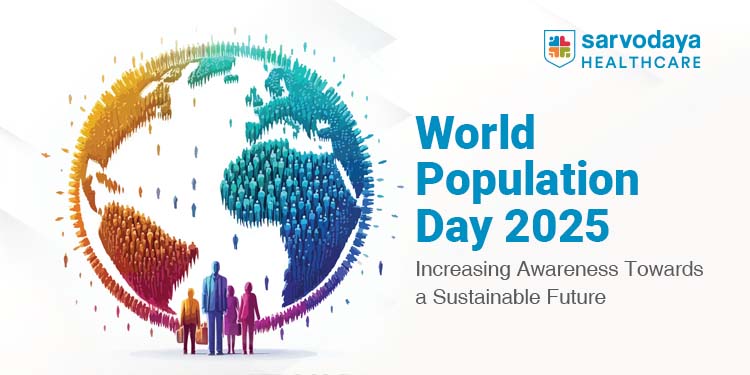It is observed globally every year on 11 July to put into sharp focus the necessity and priority of the issue of population. With the population of the world now in excess of 8 billion, the pull on world resources, the environment, and the health service has never been greater.
In this blog, we'll cover the significance of this day, the World Population Day 2025 theme and the implications of overpopulation in our lives in several ways.
Exploring World Population Day
The significance of World Population Day lies in its potential to raise awareness, educate societies, and advocate for responsible decision-making in family planning and population control. Every year, the day champions open discussions concerning reproductive health and gender equality and the need for sustainable development.
This is of great relevance to countries like India, whose urban population density is among the highest in the world. By bringing up these issues before the people, World Population Day develops collaboration among governments, NGOs, and people in the efficient control of population issues.
World Population Day Theme 2025
Each year, World Population Day is marked by a specific theme that reflects the most pressing concerns related to population growth and human development. The World Population Day theme 2025 is centred around ‘Empowering Communities, Sustaining the Planet’. This theme emphasises the crucial link between population control, resource management, and environmental sustainability.
The objectives of this year’s theme are:
- Encouraging community-led solutions for managing population-related challenges
- Providing healthcare services, especially in areas without amenities
- Educating young people on reproductive rights and family planning
- Promoting environmental awareness through population and resource balance
- Strengthening collaboration between government, healthcare institutions, and civil society.
Effects of Overpopulation on Society
The consequences of overpopulation are wide-ranging and have a profound impact on nearly every aspect of life. As the global population continues to increase, the demand for food, water, housing, energy, education, and healthcare rises exponentially. Unfortunately, in many regions, the available resources and infrastructure fail to keep up with it.
Let’s take a closer look at the most critical effects:
- Increased pressure on healthcare systems, making it harder for hospitals to provide timely care
- Shortages in housing and education, particularly in urban centres
- Rising unemployment, especially among the youth in overpopulated regions
- Depletion of natural resources, including water, forests, and agricultural land
- Harm to the environment through air pollution, climate change, and loss of biodiversity
- Overcrowding in cities leads to reduced quality of life and increased health risks.
Importance of Sustainable Population Increase
Sustainable population growth is a concept that focuses on maintaining the balance between the population and the supply of the necessary resources (food, water, shelter, education and healthcare). If the population growth in a region exceeds the capacity of the area to sustain such growth, it leads to degradation in the quality of life and more pressure on the environment.
The following are some of the most important reasons why sustainable population growth is essential:
- Lessens pressure on natural resources: Saving it for future generations as well
- Promotes economic growth: Balances labour supply with job opportunities.
- Enhances the health of the population: Owing to the improved access to healthcare and food, the population is healthier.
- Fosters sustainability of the environment: To minimise the human ecological footprint.
- Secures social stability: This is because overcrowding, displacement and poverty lead to social instability.
How India is Addressing Population Challenges
India, with a population of more than 1.4 billion, has been working hard to address the problem of overpopulation through the concerted efforts of policy measures, medical reforms, and education. Therefore, the government, working together with non-governmental organisations and medical practitioners, has initiated a number of programmes towards controlling the rate of population growth without infringing on human rights.
Some of the most important initiatives are:
- National Family Planning Programme: Provides free contraceptives and counselling services.
- Mission Parivar Vikas: Focuses on high-fertility districts and focuses on greater awareness campaigns.
- Comprehensive sex education: To educate young people regarding reproductive health in schools and colleges.
- Public-private partnerships: Make healthcare and family planning services more accessible to the masses.
- Digital platform use: To create population control awareness in the rural and urban regions.
- Community health: Preventive care and maternal facilities, such as the best hospital in Faridabad, Delhi NCR are encouraging people to use their services, which lightens the load on the public infrastructure.
Role of Healthcare Institutions in Supporting the Cause
The initiatives by healthcare organisations are one of the key elements in promoting population control and achieving the objectives of sustainable population increase.
The major contributions of the healthcare institutions are:
- Providing free or subsidised family planning services, such as the distribution of contraceptives.
- Maternal and child health counselling, particularly in under-represented communities.
- Awareness campaigns are run on the rights to reproduction, teenage health and safe childbirth practices.
- Working with NGOs, local governments and schools on long-term educational programmes.
- Targeting those areas where interventions are most needed, researched using data and analytics.
Conclusion
World Population Day 2025 is an important reminder of the rising challenges of uncontrolled population growth and the importance of harmony between the human population and the planet, with its theme of ‘Empowering Communities’ and ‘Sustaining the Planet', this year.
Sarvodaya Hospital, Faridabad, is one of the leaders of this mission. Being a leading hospital in Faridabad, it provides full reproductive health services, counselling and education outreach that enables the family to make informed choices. Sarvodaya also helps in early diagnosis and preventive consultation with the help of advanced medical infrastructure and patient-centric care, and this will help in healthier communities and a sustainable tomorrow.
We can all contribute to celebrate the importance of World Population Day by advancing the activities that educate, empower and care so as to create a world where every life is nurtured with dignity and balance.

















